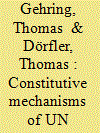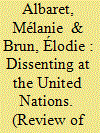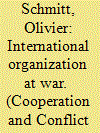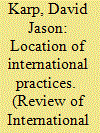|
|
|
Sort Order |
|
|
|
Items / Page
|
|
|
|
|
|
|
| Srl | Item |
| 1 |
ID:
164439


|
|
|
|
|
| Summary/Abstract |
Based upon the current debate on international practices with its focus on taken-for-granted everyday practices, we examine how Security Council practices may affect member state action and collective decisions on intrastate conflicts. We outline a concept that integrates the structuring effect of practices and their emergence from interaction among reflective actors. It promises to overcome the unresolved tension between understanding practices as a social regularity and as a fluid entity. We analyse the constitutive mechanisms of two Council practices that affect collective decisions on intrastate conflicts and elucidate how even reflective Council members become enmeshed with the constraining implications of evolving practices and their normative implications. (1) Previous Council decisions create precedent pressure and give rise to a virtually uncontested permissive Council practice that defines the purview for intervention into such conflicts. (2) A ratcheting practice forces opponents to choose between accepting steadily reinforced Council action, as occurred regarding Sudan/Darfur, and outright blockade, as in the case of Syria. We conclude that practices constitute a source of influence that is not captured by the traditional perspectives on Council activities as the consequence of geopolitical interests or of externally evolving international norms like the ‘responsibility to protect’ (R2P).
|
|
|
|
|
|
|
|
|
|
|
|
|
|
|
|
| 2 |
ID:
185792


|
|
|
|
|
| Summary/Abstract |
The Venezuelan participation in the United Nations Security Council (UNSC) in 2015 and 2016 was expected to be a challenge for the institution, as the Maduro government adopted controversial positions at the General Assembly (UNGA). However, Venezuela contestation line did not appear clearly at the UNSC. Drawing upon an in-depth qualitative study, Erving Goffman's work, and literature on contestation in international organisations (IOs), we interpret this apparent inconsistency from the concept of interaction order. We argue that the UNGA and the UNSC each constitutes a specific interaction order that influences the way contestation practices are channelled. The contestation practices Venezuelan representatives set up at the UNGA hardly work during the UNSC official sessions, where they adapt their practices to its interaction order. Venezuelan representatives also use informal and backstage actions to express their dissent, without avoiding being called into order. Venezuela's moderation at the UNSC results from an invisibilisation of contestation by interaction practices.
|
|
|
|
|
|
|
|
|
|
|
|
|
|
|
|
| 3 |
ID:
156551


|
|
|
|
|
| Summary/Abstract |
This article investigates the NATO campaign in Afghanistan through a practice-based approach. The structural distribution of power within NATO, which is obviously in favor of the US, does not automatically lead to Washington’s desired outcomes, and US delegates must competently perform a certain number of practices for their power advantage to take its full effect. The article also illustrates how looking at practices helps to explain policy decisions, such as NATO’s decision to engage in Afghanistan, the establishment of an International Security and Assistance Force (ISAF) strategy and the wording of policy papers. By studying a case of military diplomacy, the article contributes to the emerging scholarship aimed at bridging the gap between diplomatic studies and practice-based approaches to International Relations.
|
|
|
|
|
|
|
|
|
|
|
|
|
|
|
|
| 4 |
ID:
123398


|
|
|
|
|
| Publication |
2013.
|
| Summary/Abstract |
This article opens up space to challenge state-centrism about human rights practice. To do so, it presents and critically assesses four methods that can be used to determine who and/or what counts as a part of any international practice: the agreement method, which locates a practice by referring to speech acts that define it; the contextual method, which locates a practice by referring to the actions, meanings, and intentions of practitioners; the value method, which locates a practice by identifying a value or principle that the practice reflects or instantiates; and the purpose method, which locates a practice by constructing an account of the sociopolitical reason(s) for a practice's existence. The purpose method, based on an interpretation of Rawls' constructivism, is developed, in a way that focuses on practitioners' judgement-based reasons to assign responsibility for human rights to any state or non-state actor.
|
|
|
|
|
|
|
|
|
|
|
|
|
|
|
|
|
|
|
|
|